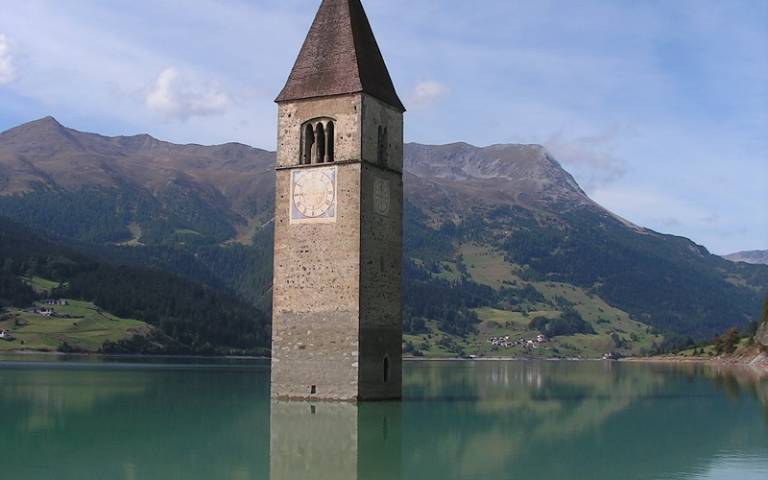Call for Papers: Dams, Displacements, Legacies - DEADLINE EXTENDED
29 January 2024
The Making of Inland Reservoirs in Global, Comparative and Multidisciplinary Perspectives: An Interdisciplinary conference at UCL, 22-24 May 2024

Our ever-hotter summers bring forgotten things to light: from Catalunya to Wales, ruined habitations surface from depleted reservoirs to join permanent reminders of communities lost to the creation of dams, like the church tower of Curon Venosta / Graun im Vinschgau in Italy, which emerges from a lake created in 1950. These sights recall many comparable cases, past, recent and present, all over the world: in 2000, the World Commission on Dams estimated that since 1950, construction of dams involuntarily displaced about 40-80 million people globally.
Such drowned structures seem to rise, spectral, from the past to interrogate the present. What can they tell us about humans’ changing relationships with their environments? Who owns water, decides on its use, and profits? How can we evaluate the paradox in which creating dams to manage natural resources or to generate ‘clean’ energy in an age of climate and energy crisis destroys natural environments?
What of the damage to human, cultural, and linguistic environments? What (forced) human displacements have followed the creation of reservoirs, and with what long-term consequences? Noticeably, the specific cases cited above impacted minoritized (linguistic) communities: issues in power, identity and language break forth from these troubled waters.
We ask, too: how are these events commemorated in community and historical memory, in discursive and artistic forms? Can such work help us to understand the losses it records? And finally, might anything be learned from the histories of these drowned communities, as we face the prospect of a future threatened by catastrophic, human-induced submersion?
Our conference will explore the complex power dynamics involved in floodings, reflect on the loss and trauma of displacement, and begin to evaluate the environmental gains and costs of dams. We wish to examine too, in all its forms, the work of representing and commemorating these events.
We now call for proposals for papers on any aspect of these themes, from all disciplines as well as comparative, multi-disciplinary perspectives. Our fields of interest thus include (but are not limited to) history, geography, anthropology, social, literary, cultural, film and memory studies, science and engineering.
While a key geographic focus lies on Europe, and we welcome proposals for papers on European case studies, we are also interested in proposals which highlight intertwined, entangled histories between that continent and others. Papers might, for example, draw on global area studies to uncover colonial legacies and transnational exchanges and networks; address questions about energy injustice and the exploitation of minorities in and beyond the European continent; or offer comparative analyses of European and other case studies.
Application process
Abstracts of no more than 500 words and a short CV or professional biography of no more than 200 words should be sent to: Anna Koch anna.koch@ucl.ac.uk and Mererid Puw Davies mererid.davies@ucl.ac.uk by the new date of February 15, 2024.
Financial Support
Limited funding will be available for PhD students, Early Career Researchers and other scholars who are unable to access travel and research funding from their institutions. If you wish to apply for this financial support, please include an indication of your professional situation, costings for your travel and the sum you wish to request.
Publication
Selected papers will be published in a guest-edited special issue of the Journal of European Studies.
Organisers
- Dr Anna Koch, UCL School of East European and Slavonic Studies (SSEES)
- Professor Mererid Puw Davies, UCL School of European Languages, Cultures and Society-Centre for Multidisciplinary and Intercultural Inquiry (SELCS-CMII)
We welcome questions and enquiries. Sponsored by UCL’s Global Engagement Fund and the Journal of European Studies and supported by the Institute of Advanced Studies (IAS).
 Close
Close

